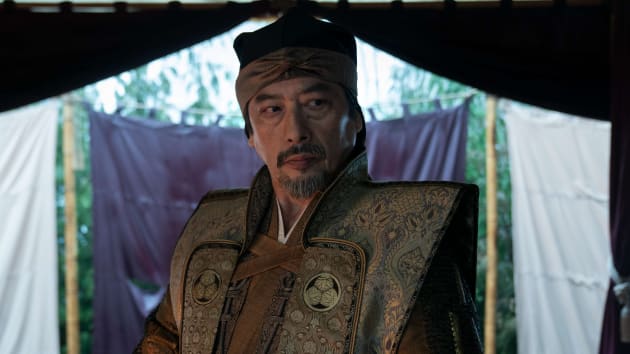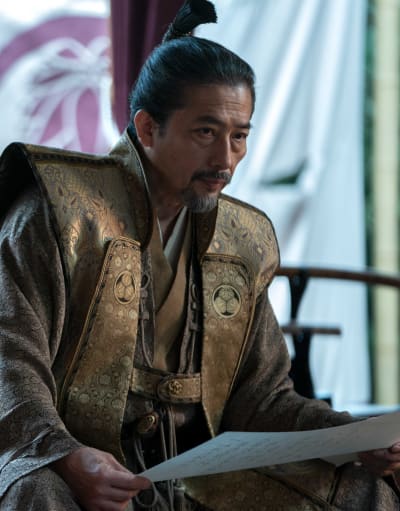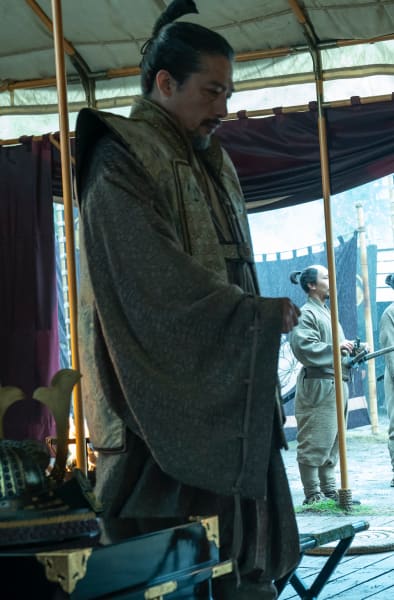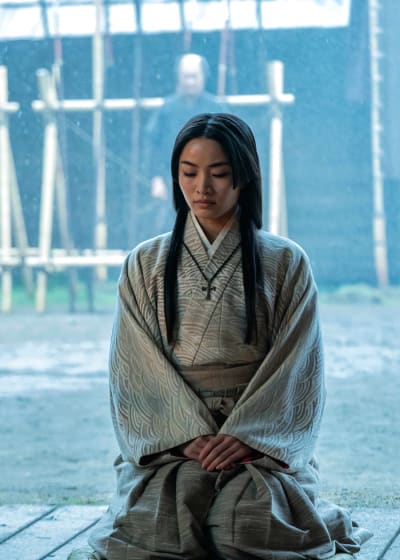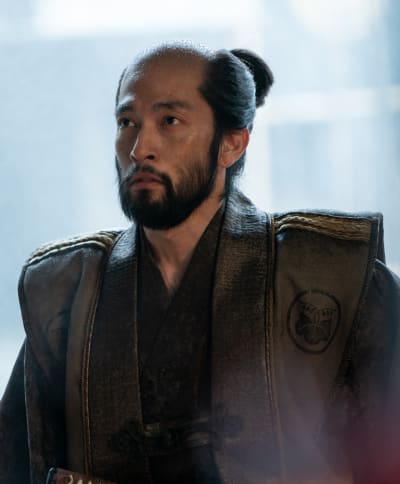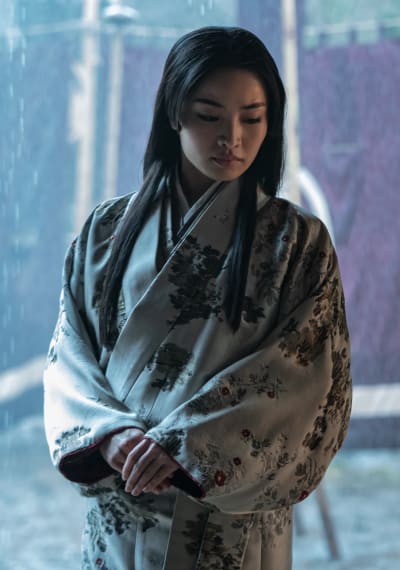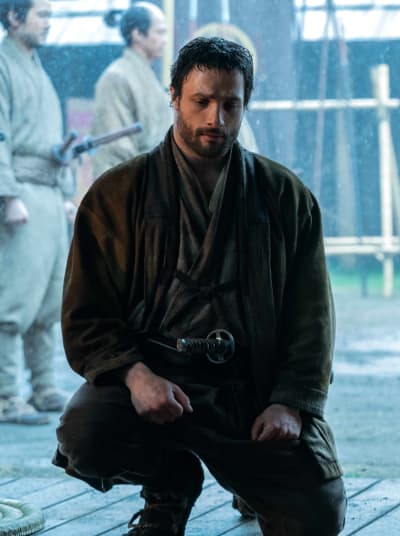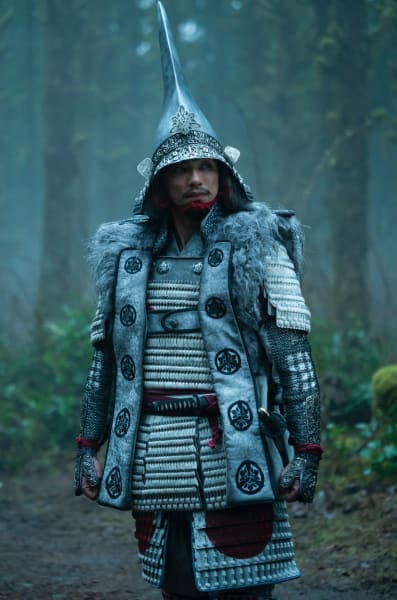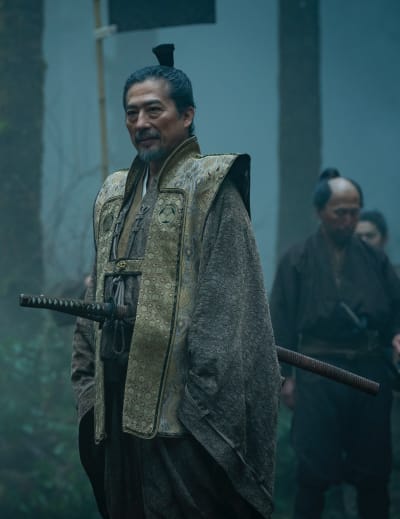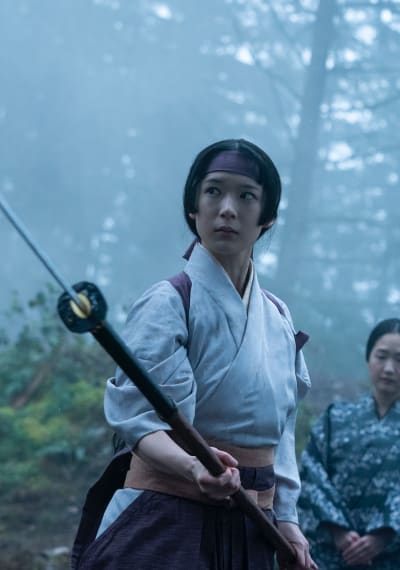When the previous episode of Shogun ended with Toranaga’s rousing call to arms, we assumed that Operation Crimson Sky couldn’t be far behind.
Sure enough, A Stick of Time opens in the aftermath of what looked to be a very bloody battle.
If you’re a fan of this show’s unflinching portrayal of feudal carnage, then you probably dug this gory scene, with its many battered corpses and its close-up beheading.
But you may have felt a bit let down moments later when some dude runs through the battlefield screaming, “The war is over!” Well, that was fast!
And not only that, Toranaga has won!
Just when we begin to get the sense that we missed out on something very important, onscreen text reveals that we’ve been bamboozled, and what we’re witnessing is actually the wake of destruction left by Toranaga’s first battle 46 years prior.
The fresh-faced young warrior accepts his enemy’s surrender and assists him with his grisly seppuku.
And while we’ve been observing Toranaga‘s political maneuvers since Shogun’s pilot episode, it’s possible that no scene thus far has been more revealing of his character.
This is a man whose warrior instincts were forged in fire, who won his first battle before he pillowed his first girl, and who has never known a life in which the possibility of a violent death was not an ever-present threat.
So when Toranaga seeks to make amends with his long-lost brother, we can safely assume that their rift isn’t a result of lingering resentment from that time they brought the same dish to the family potluck.
But some aspects of family life never change, and after a little good-natured ribbing Toranaga and Lord Saeki decide to get hammered and let bygones be bygones. Or so we’re led to believe.
A subsequent conversation with Mariko reveals that Toranaga still isn’t a big fan of his “mongrel half-brother,” and he uses the same tactic to win him over that he previously used on Blackthorne — namely, top-tier prostitutes.
Speaking of gifts, honors, and allies, the Anjin is understandably curious about what sort of role he’ll be playing once the Crimson Sky plan comes to fruition.
Toranaga has never been one to post his plans on a billboard, so Blackthorne isn’t shocked when the daimyo declines to divulge details, but even so, the exchange contributes to the mounting friction between these uneasy allies.
As last week’s episode established, Gin and Kiku are more powerful than they might initially seem, and pillowing is never just pillowing on Shogun.
The ever-prickly Omi is upset that Saeki is getting so much of Kiku’s time, but he redirects his anger to a more acceptable target — Blackthorne, whom he accuses of soiling Gin’s tea house.
Gin, as always, is unperturbed, and she flips the situation to her advantage by suggesting that Kiku is infatuated with someone else.
From there, we switch focus to another of this show’s dynamic, fully-formed female characters, Fuji.
A figure who might have been reduced to nothing more than a traumatized survivor on a lesser series is here given room to grow as well as grieve.
When she’s presented with the ashes of her husband and son, Fuji once again longs to join them in the afterlife.
But she’s no mere bereft widow, and we know the grit, ingenuity, and temerity of which she’s capable.
Shogun places Toranaga, Blackthorne, and Mariko in the spotlight most frequently, but Fuji embodies their best traits and provides the clearest thematic link between their storylines in a way that makes her an equally indispensable character.
When Hiromatsu encourages her to continue fighting for victory, Fuji’s torrent of conflicting emotions reminds us that while she shares Blackthorne’s courage and Toranaga’s commitment to duty, she also possesses Mariko’s knowledge of the futility of it all.
Proving once again that visiting relatives have been getting drunk and acting obnoxious since time immemorial, Saeki gets into the saké and publicly disrespects Toranaga in a manner that likely would have cost anyone else their head.
He then perpetrates an act of betrayal that makes a story of childhood incontinence look like — well, kids’ stuff.
Saeki’s official reasons for betraying his brother and nephew to the Council of Regents might be political, but it’s plain that he was primarily motivated by old-fashioned sibling rivalry.
Of course, Saeki isn’t the only one whose allegiances are uncertain. Yabushige has been playing both sides of the fence from the get-go, and the delivery of his general’s head in a dumpling steamer reminds him of how high the stakes have become.
Gin’s wisdom and entrepreneurial ambition once again come to the fore, as she uses her stick of time with Toranaga to share her vision of a brighter future in which courtesans are unionized and permitted to work together in a centralized brothel district.
Fate is like a sword. Useful only to those who can wield it.
Gin
This is no mere business plan, however. Gin is pleading for basic human rights and dignity, and for a moment, it looks as though Toranaga’s new awareness of his own mortality — the speed with which his incense stick is burning down — might lead him to consider her proposal.
But he’s too close to despair to consider the problems of his subjects.
Fortunately, Gin — who’s used her limited screen time thus far to make a case for herself as this show’s coolest character — possesses levels of guile that Toranaga and his generals can only dream of.
She reminds Toranaga of their common hardships and ambitions and hints that he may have permitted Saeki to penetrate the village’s perimeter with his army.
Even though the discord within the Council of Regents predates the arrival of Blackthorne’s ship, multiple characters blame the Anjin for their nation’s current troubles.
One of them is Yabushige, who takes out his frustration during a violent “training” session that’s observed with great interest by Buntaro — who proceeds to remind us that he also is not a fan of Blackthorne by nearly decapitating the Brit.
The situation comes to a head — no pun intended — later in the episode when Buntaro begs Toranaga for permission to remove the Anjin’s noggin for the crime of using said cranium to ogle Mariko.
He’s denied on the grounds that such an action would implicate Mariko, too — but it seems that Toranaga also has some concerns about the translator’s loyalty.
Things once again take a turn for the very bleak, as Mariko becomes the second character of the episode to beg for permission to take her own life.
The endless rains and fog contribute to the episode’s atmosphere of pervasive gloom, and Toranaga follows the lead of so many of his subjects when he gives in to hopelessness and surrenders himself to his brother.
Even when there’s evil in this land, no one has the right to tear the realm apart. Crimson Sky was a mistake.
Nagakado’s failed attempt to murder Saeki and his own subsequent ignominious death are sure to be among this season’s most divisive plot points, but they effectively tie together the episode’s primary thematic interests:
We’re reminded that important things happen in the shadows of the willow world, that sex and violence make for awkward bedfellows (mirroring Nagakado’s earlier remarks about the similarities between pillowing and war), and that fate can be as ridiculous as it is tragic.
When the scene cuts to black for a music-less closing credits sequence, we feel every bit as miserable as Toranaga and his downtrodden vassals.
And we’re once again reminded that no show on television so consistently demonstrates such a masterful control of tone.
Three episodes remain in this season, but as Toranaga finalizes his will (thankfully, he doesn’t forget Gin) and seemingly accepts his fate, A Stick of Time takes on the feeling of a pre-finale:
It’s the sort of episode that sets the stage for the climactic battle to come.
The title refers literally to the incense that’s used to measure time in the brothels of feudal Japan but also to the fleeting nature of human lives.
This hour of Shogun depicts a hinged moment between monumental events — a period in which time briefly slows down and offers a moment for contemplation before everything changes forever.
While we know there’s much more story left to tell, A Stick of Time left us with the sense that all is lost — a set of dire circumstances that will hopefully make our protagonists’ forthcoming heroics all the more awe-inspiring.
What did you think, TV fanatics? Was this the bleakest episode thus far? Did it get a little too dark for your taste?
Hit the comments section below to share your thoughts.
Tyler Johnson is an Associate Editor for TV Fanatic and the other Mediavine O&O sites. In his spare time, he enjoys reading, cooking, and, of course, watching TV. You can Follow him on X and email him here at TV Fanatic.
Read the original article here
